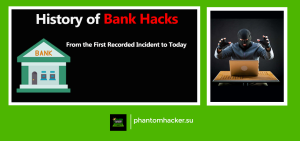Introduction
In an era where technology evolves at a rapid pace, the realm of cybersecurity remains a pivotal concern. The concept of hacking bank accounts and ATM machines using free software is a topic that intrigues many, raising questions about its feasibility, legality, and ethical considerations. In this comprehensive article, we delve deep into this fascinating subject, shedding light on the possibilities, risks, and implications associated with attempting such acts.
Looking to hire a hacker or ethical guy for money transfer hack? We offer professional hacking services which includes money transfer hacking, money transfer funding and other quality hacking services. Visit our website or contact us to discuss your needs.
Legit Site To Hire a Hacker
🌐Visit: phantomhacker.su
📧Email: [email protected]
Contact: 👉 Hit here

Hack a Bank Account and ATM Machine with a Free Software: Demystifying the Process
The thought of hacking into bank accounts and ATM machines might seem like something out of a Hollywood blockbuster. However, before we delve into the details, it’s essential to clarify a critical point: hacking bank accounts and ATM machines using free software is illegal and unethical. Engaging in such activities can result in severe legal consequences and irreparable damage to personal and financial security.
This post is sponsored by PHANTOM HACKERS, phantomhacker.su is the oldest hacking group offering general hacking services and money transfer hack services. We have access to bank servers and other payment/money transfer platforms worldwide. We can authorize money transfers to any account in the world provide funding for individuals and business through money transfer hack. Hire a hacker.
Wesbsite: https://phantomhacker.su/
Email: [email protected]
Services: Unlimited Money Transfers — Business/Project Funding: HIRE A HACKER SERVICES
Understanding the Myths and Realities
The Myth of “Free Software” Miracles
It’s crucial to debunk the myth of free software that supposedly allows anyone to effortlessly hack into bank accounts and ATM machines. While there are tools and techniques available in the dark corners of the internet, the reality is far more complex. Legitimate banks and financial institutions invest heavily in robust security measures to protect their customers’ assets.
The Reality of Advanced Security Protocols
Modern banking systems employ cutting-edge security protocols, including encryption, multi-factor authentication, and intrusion detection systems. These measures aim to safeguard against unauthorized access and fraudulent activities. Attempting to hack into these systems requires expertise that extends far beyond free software solutions found on the internet.
The Legal and Ethical Conundrum
Legal Ramifications of Hacking
Engaging in hacking activities, even with the intent of accessing your own accounts or those of others, is considered a criminal offense in most jurisdictions. The Computer Fraud and Abuse Act (CFAA) in the United States, for example, imposes severe penalties for unauthorized access to computer systems. These penalties can include substantial fines and lengthy prison sentences.
Ethical Considerations
Ethically, hacking into bank accounts and ATM machines is a contentious issue. Such actions violate individuals’ privacy, compromise financial security, and can have far-reaching consequences. Responsible use of technology involves respecting the boundaries of legality and ethical standards.
The Dark Side: Scams and Frauds
Phishing and Social Engineering
One common approach cybercriminals use to access bank accounts is through phishing and social engineering. By crafting convincing messages or impersonating legitimate entities, hackers trick individuals into revealing sensitive information, such as passwords and account details. This highlights the importance of cybersecurity awareness and vigilance.
Malware and Remote Attacks
Another method involves deploying malware onto victims’ devices. This malware can record keystrokes, capture login credentials, and provide unauthorized access to the hacker. To prevent falling victim to such attacks, individuals should regularly update their devices’ software, use reputable security software, and avoid downloading suspicious content.
Frequently Asked Questions
Q: Can I really hack a bank account with free software? A: No, hacking bank accounts using free software is a misconception. Modern banking systems have advanced security measures in place to prevent unauthorized access.
Q: What are the potential legal consequences of hacking? A: Hacking into bank accounts and ATM machines is a criminal offense that can lead to severe penalties, including hefty fines and imprisonment.
Q: Is ethical hacking a legitimate practice? A: Ethical hacking, conducted with permission and for the purpose of improving security, is a legitimate and valuable practice. However, unauthorized hacking is unethical and illegal.
Q: How can I protect myself from hacking attempts? A: Stay vigilant against phishing scams, regularly update your devices’ software, use reputable security software, and avoid downloading suspicious content.
Q: Are there ethical ways to enhance cybersecurity? A: Yes, individuals can enhance cybersecurity by educating themselves about potential threats, practicing good password hygiene, and supporting initiatives that promote digital security.
Q: What should I do if I suspect my account has been compromised? A: If you suspect unauthorized access to your account, contact your bank or financial institution immediately to report the issue and take appropriate action.
Conclusion
In a digital age where convenience and security intersect, the idea of hacking bank accounts and ATM machines using free software sparks curiosity and concern. This article has shed light on the myths, realities, and ethical considerations surrounding this topic. It’s crucial to emphasize that attempting to hack bank accounts and ATM machines is both illegal and unethical, with severe legal consequences. Instead of exploring the darker aspects of hacking, individuals are encouraged to invest in their cybersecurity awareness, adopt safe online practices, and support legitimate efforts to enhance digital security.






